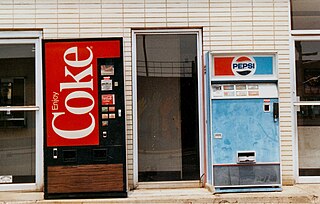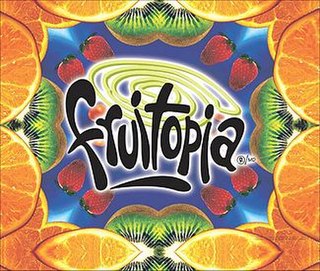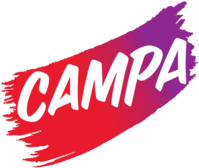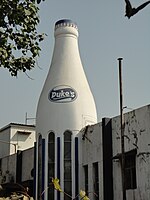
Cola is a carbonated soft drink flavored with vanilla, cinnamon, citrus oils, and other flavorings. Cola became popular worldwide after the American pharmacist John Stith Pemberton invented Coca-Cola, a trademarked brand, in 1886, which was imitated by other manufacturers. Most colas originally contained caffeine from the kola nut, leading to the drink's name, though other sources of caffeine are generally used in modern formulations. The Pemberton cola drink also contained a coca plant extract. His non-alcoholic recipe was inspired by the coca wine of pharmacist Angelo Mariani, created in 1863.

Pepsi is a carbonated soft drink with a cola flavor, manufactured by PepsiCo. As of 2023, Pepsi is the second most valuable soft drink brand worldwide behind Coca-Cola; the two share a long-standing rivalry in what has been called the "cola wars".

Crush is a brand of carbonated soft drinks owned and marketed internationally by Keurig Dr Pepper, originally created as an orange soda, Orange Crush. Crush competes with Coca-Cola's Fanta. It was created in 1911 by beverage and extract chemist Neil C. Ward. Most flavors of Crush are caffeine-free.

The Cola wars are the long-time rivalry between soft drink producers The Coca-Cola Company and PepsiCo, who have engaged in mutually-targeted marketing campaigns for the direct competition between each company's product lines, especially their flagship colas, Coca-Cola and Pepsi. Beginning in the late 1970s and into the 1980s, the competition escalated until it became known as the cola wars.
Jones Soda Co. is a beverage company based in Seattle, Washington, United States. It bottles and distributes soft drinks, non-carbonated beverages, energy drinks, and candy.

Mirinda is a brand of soft drink that was created in Spain in 1959 and has been distributed globally by PepsiCo since 1970. Its name comes from the Esperanto translation of "admirable" or "amazing".

Minute Maid is an American brand of beverages, usually associated with lemonade or orange juice, but which now extends to soft drinks of different kinds, including Hi-C. Minute Maid is sold under the Cappy brand in Central Europe and under the brand "Моя Семья" in Russia and the Commonwealth of Independent States. Minute Maid was the first company to market frozen orange juice concentrate, allowing it to be distributed throughout the United States and served year-round. The Minute Maid Company is owned by The Coca-Cola Company, the world's largest marketer of fruit juices and drinks. The firm opened its headquarters in Sugar Land Town Square in Sugar Land, Texas, United States, on February 16, 2009; previously it was headquartered in the 2000 St. James Place building in Houston.

PepsiCo, Inc. is an American multinational food, snack, and beverage corporation headquartered in Harrison, New York, in the hamlet of Purchase. PepsiCo's business encompasses all aspects of the food and beverage market. It oversees the manufacturing, distribution, and marketing of its products. PepsiCo was formed in 1965 with the merger of the Pepsi-Cola Company and Frito-Lay, Inc., PepsiCo has since expanded from its namesake product Pepsi Cola to an immensely diversified range of food and beverage brands. The largest and most recent acquisition was Pioneer Foods in 2020 for US$1.7 billion and prior to it was buying the Quaker Oats Company in 2001, which added the Gatorade brand to the Pepsi portfolio and Tropicana Products in 1998.

Fruitopia is a fruit-flavored drink introduced by the Coca-Cola Company's successful Minute Maid brand in 1994 and targeted at teens and young adults. According to New York Times business reports, it was invented as part of a push by Minute Maid to capitalize on the success of Snapple and other flavored tea drinks. The brand gained substantial hype in the mid-1990s before enduring lagging sales by the decade's end. While still available in Canada and Australia as a juice brand, in 2003, Fruitopia was phased out in most of the United States where it had struggled for several years. However, select flavors have since been revamped under Minute Maid. Use of the Fruitopia brand name continues through various beverages in numerous countries, including some McDonald's restaurant locations in the United States, which carry the drink to this day.

Slice was a line of fruit-flavored soft drinks originally manufactured by PepsiCo and introduced in 1984 but discontinued by PepsiCo in North America in the late 2000s.
Energy Brands, also doing business as Glacéau, is a privately owned subsidiary of The Coca-Cola Company based in Whitestone, Queens, New York, that manufactures and distributes various lines of drinks marketed as enhanced water. Founded in May 1996 by J. Darius Bikoff with an electrolyte enhanced line of water called Smartwater, Energy Brands initially distributed its products to health food stores and independent retailers in the New York area. Adding Fruitwater and Vitaminwater to its line in 1998 and 2000, respectively, the company expanded to nationwide distribution in the early 2000s.

Campa Cola is a soft drink brand in India. It was a market leader in the Indian soft drink market in the 1970s and 1980s in most regions of India until the advent of the foreign players Pepsi and Coca-Cola after the liberalisation policy of the P. V. Narasimha Rao government in 1991.
Parle Agro Private Limited is an Indian company that owns Frooti, Appy Fizz, LMN, Hippo, Bailley and Smoodh brands.

Bisleri International is an Indian multinational company which is best known for the eponymous brand of bottled water. The company was started in the 1970s by Ramesh Chauhan, and sells bottled water and soft drinks.

Blue Sky Beverage Company was a beverage company that produced soft drinks and energy drinks. It is a wholly owned subsidiary of the Monster Beverage Corporation. The company was established in Santa Fe, New Mexico, in 1980, where it remained until it was purchased by Monster in 2000. Coca-Cola North America took ownership of Blue Sky Sodas, Hansen’s Juice Products, Hansen’s Natural Sodas, Hubert’s Lemonade, Peace Tea and other non-energy drink brands as part of Coke’s partnership with Monster Beverage Corp on Jun 12, 2015. Blue Sky Beverage Company now operates out of Corona, California. The southwestern look and feel of the artwork on the soda cans is reminiscent of the company's roots in New Mexico.

Sunkist is a brand of primarily orange-flavored soft drinks that launched in 1979. Sunkist primarily competes with The Coca-Cola Company's Fanta brand and Keurig Dr Pepper's Orange Crush brand.

EstCola is a cola soft drink from Thailand, manufactured by Sermsuk Public Company Limited. It was launched on 2 November 2012.

Varun Beverages Limited (VBL) is an Indian multinational company that manufactures, bottles and distributes beverages. It is the largest bottling company of PepsiCo's beverages in the world outside the United States. The company was incorporated in 1995 as a subsidiary of RJ Corp, and named after founder Ravi Jaipuria's son.
















